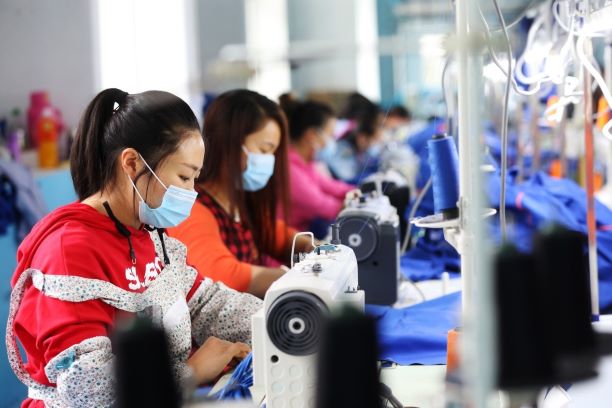China to ensure follow-up support for poverty-alleviation relocation
By Eldak, People’s Daily
Employees work at a garment factory established near a resettlement community in Qianjiang district, southwest China’s Chongqing municipality, May 16. (Photo by Yang Min, People’s Daily Online)
Moving to a new house from the desert and finding her sons’ with stable jobs are the happiest two things of Wuahan Roza, a resident in Darya Boyi village, Yutian county of northwest China’s Xinjiang Uygur Autonomous Region, who shared her joy with the first secretary Zhao Gang of her village for poverty alleviation a couple days ago.
The relocation was sure a big deal for Darya Boyi, which sat at the heart of the Taklimakan Desert. After the last 114 households moved into the new residence with power and water supply and road access 91 kilometers from their old town on Sept. 27, 2019, how to settle them rose as a prominent issue.
Most of the young people in the village herded sheep for a living in early 2018 when Zhao first arrived at the village. However, they were not able to secure stable income due to the lack of intensive management.
In June 2018, the village proposed establishing a husbandry cooperative that manages villagers’ sheep collectively, thus freeing the labor herding the sheep. The approach was firstly doubted by many. However, after a year’s operation, those who joined the cooperative not only received bonus, but also liberated themselves and made money by doing other jobs.
As a result, more and more villagers applied to entrust their sheep to the cooperative, including Akbar Abbakr, one of Wuahan Roza’s sons who wanted to seek a job but lacked vocational skills – a case that applied to most of the young villagers there.
To solve the problem, the village invited teachers from a school for farmers and herdsmen to train the young villagers, and matched them with relevant employers.
Thanks to the efforts, Akbar Abbakr now works in a factory in northern Xinjiang, earning a monthly salary of over 4,000 yuan ($563.5). He even remitted money to his family recently.
Apart from seeking a job outside, a growing number of villagers are choosing to work near their homes in recent years.
Earlier last year, the village established a cooperative producing and selling agricultural products, and invited experts from Xinjiang Academy of Agricultural Sciences and Yutian county for cultivation training. A total of over 300 people now work for the cooperative.
According to statistics released by National Development and Reform Commission, China has built over 2.6 million resettlement houses in 39,000 resettlement areas in 22 provinces, autonomous regions and municipalities by the beginning of March this year, basically meeting the task set in the country’s 13th Five-Year Plan.
The relocation efforts resettled 9.3 million impoverished people from mountainous or inhospitable areas, and lifted 9.2 million of them out of poverty, shifting the priority of the relocation work from housing construction to follow-up support.













